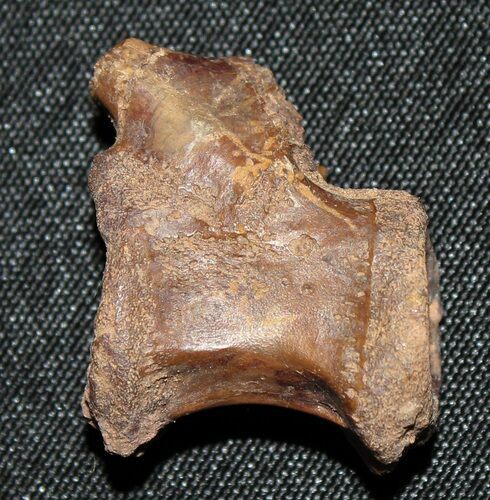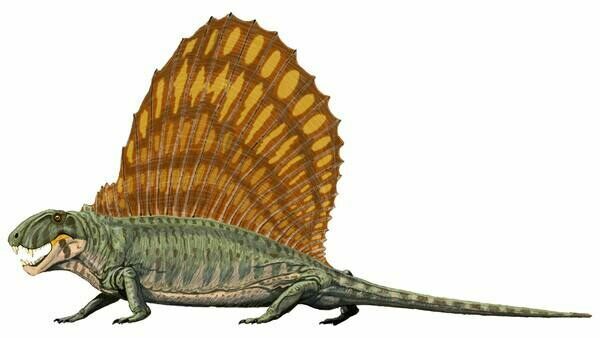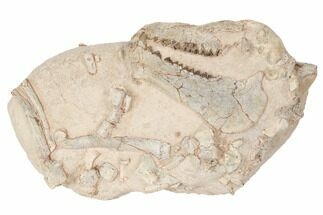This Specimen has been sold.
Dimetrodon Vertebrae Texas - Top Quality Specimen
This is an excellent vertebrae of Dimetrodon limbatus from the Nocona Formation of Texas. It was collected this past year from our partners lease in Archer County Texas. It's a good sized vertebrae with almost no surface erosion. Comes in a riker mount display case.
Dimetrodon limbatus (Cope, 1877) is an Early Permian pelycosaur. This fierce predator has a distinctive sail on it's back and could reach lengths of 12 feet and exceed 250 lbs.
The most prominent feature of Dimetrodon is the large sail on its back formed by elongated spines extending from the vertebrae. It walked on four legs and had a tall, curved skull with large teeth of different sizes set along the jaws. Most fossils have been found in the southwestern United States, the majority coming from a geological deposit called the Red Beds in Texas and Oklahoma.
Dimetrodon is often mistaken for a dinosaur or as a contemporary of dinosaurs in popular culture, but it became extinct some 40 million years before the first appearance of dinosaurs. Reptile-like in appearance and physiology, Dimetrodon is nevertheless more closely related to mammals than to modern reptiles, though it is not a direct ancestor or descendant of mammals.[3]
Dimetrodon is assigned to a group traditionally called "mammal-like reptiles"—more recently termed "stem-mammals" or "non-mammalian synapsids".[3] That is, many vertebrate paleontologists today group Dimetrodon together with mammals in an evolutionary group, or clade, called Synapsida, while they place dinosaurs with living reptiles and birds in a separate clade, Sauropsida. Single openings in the skull behind each eye, known as temporal fenestrae, and other skull features distinguish Dimetrodon and mammals from most of the earliest sauropsids.
Dimetrodon was probably one of the top predators in Early Permian ecosystems, feeding on fish and tetrapods, including reptiles as well as amphibians. Smaller Dimetrodon species may have had different ecological roles. The sail of Dimetrodon may have been used to stabilize its spine or to heat and cool its body as a form of thermoregulation. Some recent studies argue that the sail would have been ineffective at removing heat from the body, and was most likely used in sexual display.
Dimetrodon limbatus (Cope, 1877) is an Early Permian pelycosaur. This fierce predator has a distinctive sail on it's back and could reach lengths of 12 feet and exceed 250 lbs.
The most prominent feature of Dimetrodon is the large sail on its back formed by elongated spines extending from the vertebrae. It walked on four legs and had a tall, curved skull with large teeth of different sizes set along the jaws. Most fossils have been found in the southwestern United States, the majority coming from a geological deposit called the Red Beds in Texas and Oklahoma.
Dimetrodon is often mistaken for a dinosaur or as a contemporary of dinosaurs in popular culture, but it became extinct some 40 million years before the first appearance of dinosaurs. Reptile-like in appearance and physiology, Dimetrodon is nevertheless more closely related to mammals than to modern reptiles, though it is not a direct ancestor or descendant of mammals.[3]
Dimetrodon is assigned to a group traditionally called "mammal-like reptiles"—more recently termed "stem-mammals" or "non-mammalian synapsids".[3] That is, many vertebrate paleontologists today group Dimetrodon together with mammals in an evolutionary group, or clade, called Synapsida, while they place dinosaurs with living reptiles and birds in a separate clade, Sauropsida. Single openings in the skull behind each eye, known as temporal fenestrae, and other skull features distinguish Dimetrodon and mammals from most of the earliest sauropsids.
Dimetrodon was probably one of the top predators in Early Permian ecosystems, feeding on fish and tetrapods, including reptiles as well as amphibians. Smaller Dimetrodon species may have had different ecological roles. The sail of Dimetrodon may have been used to stabilize its spine or to heat and cool its body as a form of thermoregulation. Some recent studies argue that the sail would have been ineffective at removing heat from the body, and was most likely used in sexual display.
SPECIES
Dimetrodon limbatus
AGE
LOCATION
Archer County, Texas
FORMATION
Nocona Formation
SIZE
1" long
CATEGORY
ITEM
#31369
We guarantee the authenticity of all of our specimens.
 Reviews
Reviews












